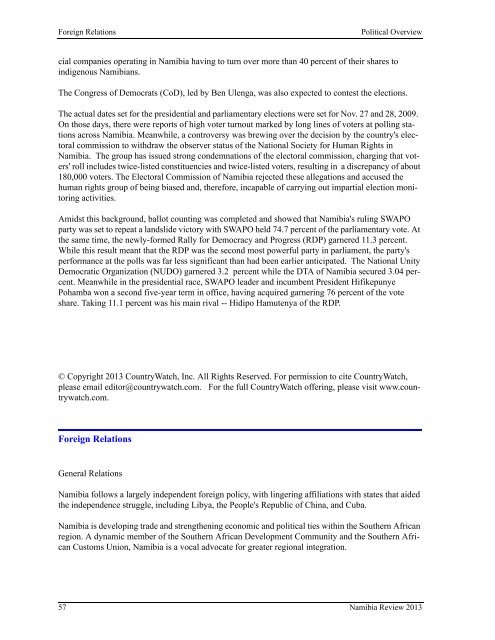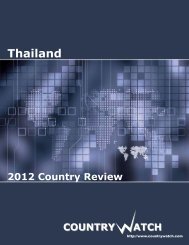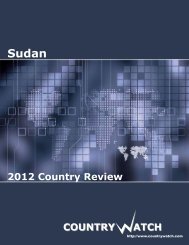Namibia - CountryWatch
Namibia - CountryWatch
Namibia - CountryWatch
Create successful ePaper yourself
Turn your PDF publications into a flip-book with our unique Google optimized e-Paper software.
Foreign Relations Political Overview<br />
cial companies operating in <strong>Namibia</strong> having to turn over more than 40 percent of their shares to<br />
indigenous <strong>Namibia</strong>ns.<br />
The Congress of Democrats (CoD), led by Ben Ulenga, was also expected to contest the elections.<br />
The actual dates set for the presidential and parliamentary elections were set for Nov. 27 and 28, 2009.<br />
On those days, there were reports of high voter turnout marked by long lines of voters at polling stations<br />
across <strong>Namibia</strong>. Meanwhile, a controversy was brewing over the decision by the country's electoral<br />
commission to withdraw the observer status of the National Society for Human Rights in<br />
<strong>Namibia</strong>. The group has issued strong condemnations of the electoral commission, charging that voters'<br />
roll includes twice-listed constituencies and twice-listed voters, resulting in a discrepancy of about<br />
180,000 voters. The Electoral Commission of <strong>Namibia</strong> rejected these allegations and accused the<br />
human rights group of being biased and, therefore, incapable of carrying out impartial election monitoring<br />
activities.<br />
Amidst this background, ballot counting was completed and showed that <strong>Namibia</strong>'s ruling SWAPO<br />
party was set to repeat a landslide victory with SWAPO held 74.7 percent of the parliamentary vote. At<br />
the same time, the newly-formed Rally for Democracy and Progress (RDP) garnered 11.3 percent.<br />
While this result meant that the RDP was the second most powerful party in parliament, the party's<br />
performance at the polls was far less significant than had been earlier anticipated. The National Unity<br />
Democratic Organization (NUDO) garnered 3.2 percent while the DTA of <strong>Namibia</strong> secured 3.04 percent.<br />
Meanwhile in the presidential race, SWAPO leader and incumbent President Hifikepunye<br />
Pohamba won a second five-year term in office, having acquired garnering 76 percent of the vote<br />
share. Taking 11.1 percent was his main rival -- Hidipo Hamutenya of the RDP.<br />
© Copyright 2013 <strong>CountryWatch</strong>, Inc. All Rights Reserved. For permission to cite <strong>CountryWatch</strong>,<br />
please email editor@countrywatch.com. For the full <strong>CountryWatch</strong> offering, please visit www.countrywatch.com.<br />
Foreign Relations<br />
General Relations<br />
<strong>Namibia</strong> follows a largely independent foreign policy, with lingering affiliations with states that aided<br />
the independence struggle, including Libya, the People's Republic of China, and Cuba.<br />
<strong>Namibia</strong> is developing trade and strengthening economic and political ties within the Southern African<br />
region. A dynamic member of the Southern African Development Community and the Southern African<br />
Customs Union, <strong>Namibia</strong> is a vocal advocate for greater regional integration.<br />
57 <strong>Namibia</strong> Review 2013




